Redditor Gets Backlash After Refusing To Get Rid Of Their Bees Despite Pleas From Their Next-Door Neighbor Whose Son Is Highly Allergic
Bees, nature's tiny wonders, have fascinated humans throughout history. Many people have embraced the art of beekeeping as a rewarding hobby and have found joy in nurturing these essential pollinators.
However, alongside the enthusiasts, there exists a segment of the population that harbors a potentially life-threatening aversion to bee stings. As beekeepers set up their hives in suburban backyards, the collision between hobbyists and allergic neighbors becomes a potential flashpoint for disputes.
For some, like our narrator (OP), this passion spans years and involves multiple hives nestled in a serene suburban haven. Additionally, they have dutifully registered and complied with local regulations, thus validating the legality of their beekeeping pursuit.
However, fate often intertwines lives in unpredictable ways, and a new chapter in our beekeeper's story unfolds when new neighbors arrive.
Apparently, the new family purchased the property without being aware of the buzzing inhabitants next door. For most families, this wouldn't have been a problem, but unfortunately, their son is highly allergic to bee stings.
In this case, we're not talking about a regular allergy, but one that has resulted in the boy being hospitalized on different occasions. Additionally, he carries an EpiPen as emergency first aid in the event of an attack.
The dilemma arises when the neighbors, understanding the risks involved, approach OP with a heartfelt plea to remove the hives. To their dismay, OP declines, as they are deeply attached to their beloved bees.
Since then, OP and the new family have been in conflict, to the point where they have tried to lobby the town board to outlaw beekeeping in the town.
Scroll down to find out how the story unfolds.
The story in detail

OP has been keeping bees as a hobby for the past 6 years

A new family moved into the house next to theirs. Unfortunately, their son is highly allergic to bee stings
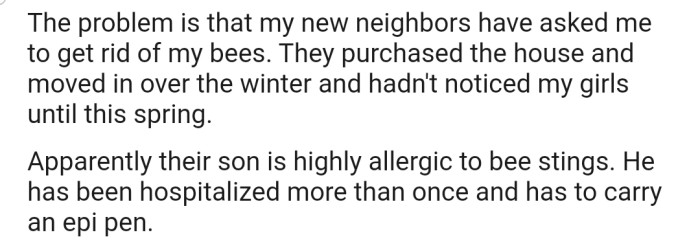
Understanding Allergies and Community Responsibility
This situation highlights the complexities of living in close proximity to others, especially when health issues like allergies are involved. Research shows that individuals with allergies often face significant social and emotional challenges, particularly in communal living situations.
A study from the Journal of Allergy and Clinical Immunology indicates that awareness and support from neighbors can greatly alleviate stress for families dealing with allergies.
They asked politely that OP get rid of their bees, but they refused
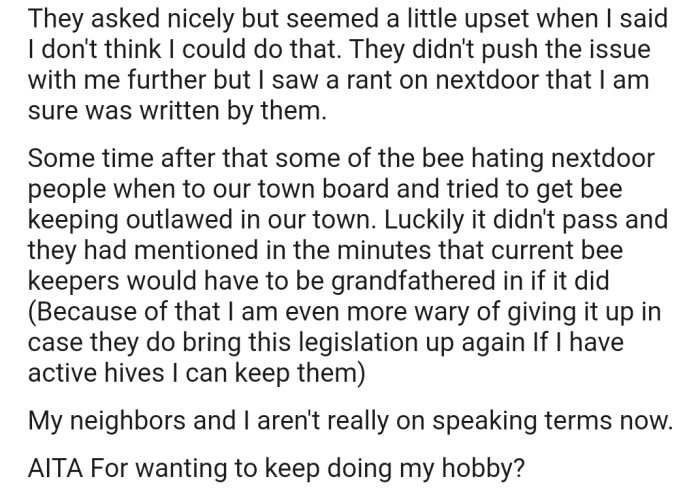
We gathered some interesting reactions from the Reddit community:
"Plenty of people are allergic to bees, and they go about their activities with caution and an EpiPen."
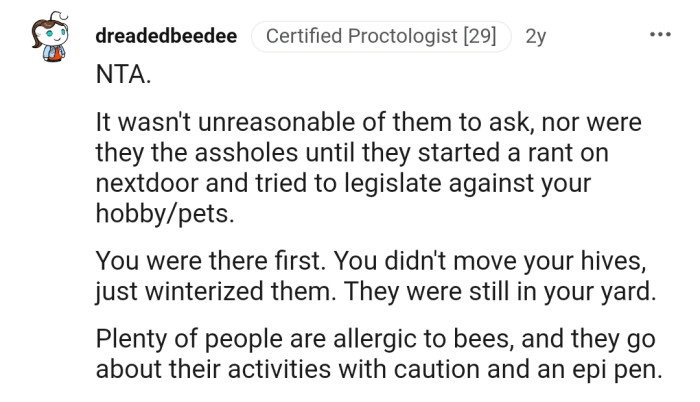
"This is just a series of unfortunate circumstances. Therefore, I will say NAH."
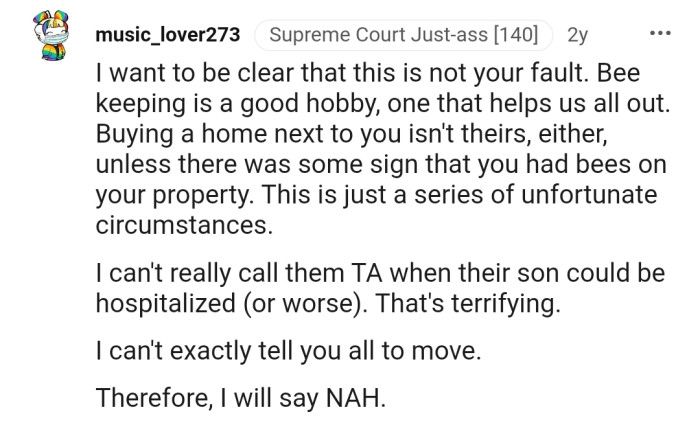
Understanding the impact of allergies on daily life is crucial for fostering a supportive community. According to research from Stanford University, when individuals are aware of each other's health concerns, they are more likely to engage in compassionate behaviors that promote community well-being.
This awareness can help bridge the gap between individuals with allergies and those who may not fully understand the implications of their actions.
"As someone with anaphylactic reactions, I feel a lot of empathy for the family."

"I, personally, would feel like an AH continuing a hobby that could kill the neighbor's child."
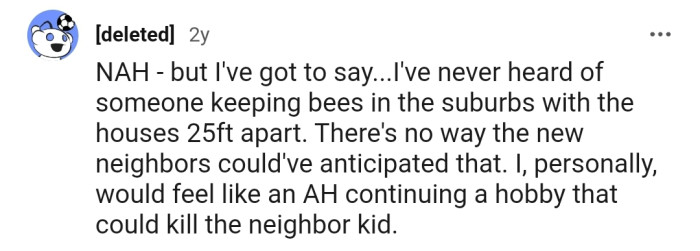
"NTA...If he doesn’t bother them, then they are unlikely to bother him."

The Importance of Open Communication
Open communication is essential in navigating conflicts related to health concerns in communal settings. According to Dr. Terri Orbuch, a relationship researcher and author, "Candid discussions about health issues can lead to improved understanding and cooperation among neighbors." Furthermore, Dr. John Gottman, a renowned marriage researcher, emphasizes that "empathetic communication is key to reducing tension and fostering collaboration in any relationship." By engaging in open dialogue, communities can work together to address health-related concerns effectively.
A creative solution that OP could consider
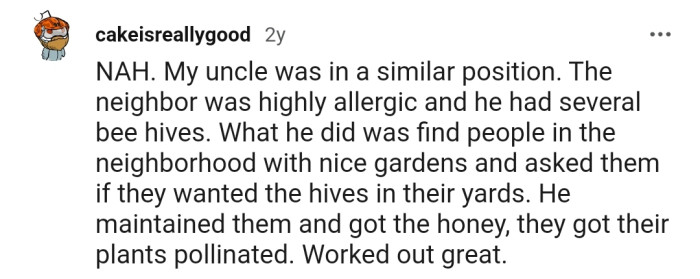
"Just one question: How would you feel if your hobby killed a child?"
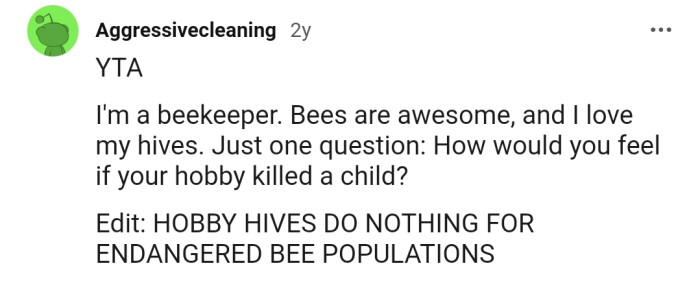
"I’m surprised the realtor didn’t mention that you had bees to them."
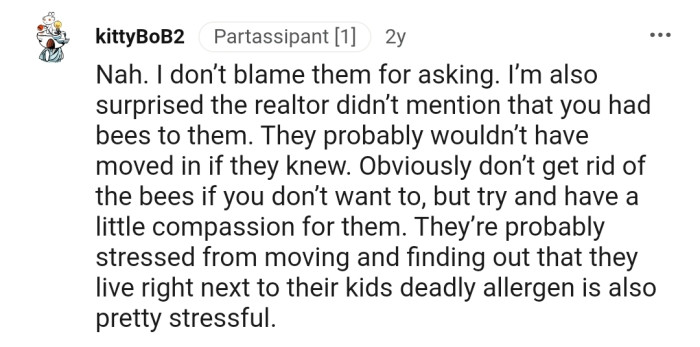
It may be beneficial for individuals to engage in discussions about health concerns and how to accommodate each other's needs. This can involve creating guidelines that respect personal boundaries while also considering the health and safety of others.
By fostering a culture of empathy and support, communities can navigate these challenges more effectively, leading to a healthier living environment for everyone.
First edit
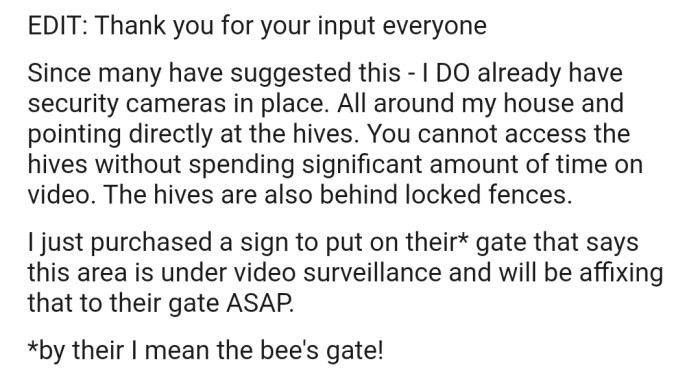
Edit 2
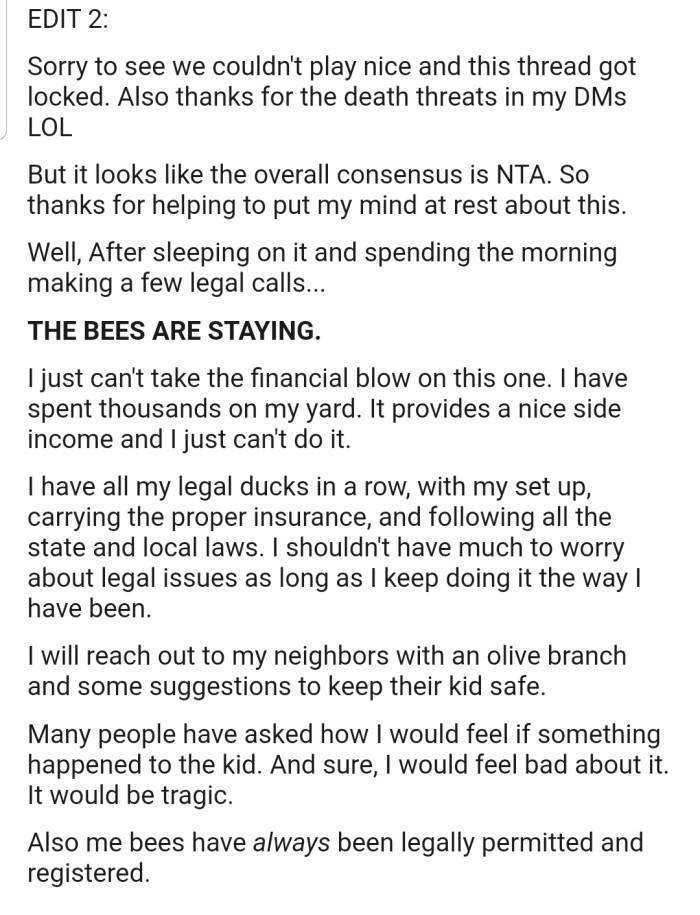
This Reddit community is torn in its decision. As much as their neighbor is justified in their request, you can't blame OP for standing their ground since they have kept the bees on their property for the past 6 years.
Many commenters have reiterated that the realtor is to blame for not informing the family about the presence of bees in the neighborhood. Regardless, people have pointed out that OP could have found a creative solution rather than give the family a flat "NO."
How would you have handled this situation if you were in OP's shoes? Tell us in the comments.
Psychological Analysis
This situation highlights the importance of mutual understanding in communal living, particularly regarding health concerns. It’s essential for neighbors to communicate openly about their needs to foster a supportive and accommodating environment.
Encouraging dialogue can help mitigate tensions and promote a healthier community for everyone involved.
Analysis generated by AI
Analysis & Alternative Approaches
In conclusion, understanding the complexities of allergies in communal living is essential for fostering a supportive environment. By prioritizing open communication and empathy, individuals can navigate these challenges effectively and create a more harmonious community.



